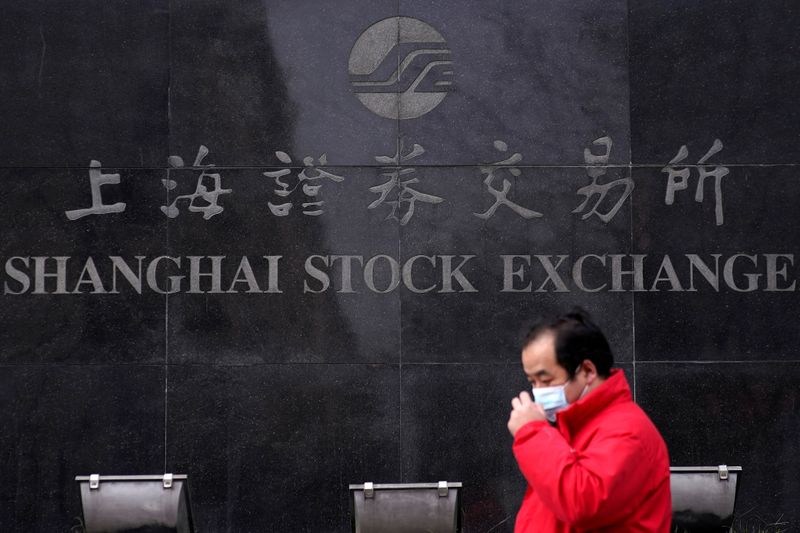By Herbert Lash and Simon Jessop
NEW YORK/LONDON (Reuters) - Global stock markets ended lower on Friday as investors grappled with fears of rising inflation and a surge in coronavirus cases while the dollar edged higher after upbeat U.S. retail sales data reaffirmed an economy in strong recovery mode.
The Commerce Department said retail sales rose 0.6% in June, contrary to an expected decline, adding weight to those who say inflation will run faster than the Federal Reserve forecasts and force interest rates to rise sooner than it projects.
Yet bond yields pared most initial gains, with the benchmark 10-year U.S. Treasury note trading at 1.2987%, or a scant 0.2 basis points higher on the day. The Fed's dovish outlook outweighed fears of a prolonged inflation spike.
Equity markets declined as investors turned risk-averse, with defensive stocks gaining both on Wall Street and in Europe.
MSCI's all-country world index, a gauge of global shares, closed down 0.62% at 719.17. The index scaled a record peak earlier in the week, but lost 0.61% by week's end.
In Europe, the FTSEurofirst 300 index fell 0.38% to 1,754.64. European defensive shares rose, with real estate, utilities and healthcare up between 0.5% and 1% as worries about the coronavirus mounted.
England's coronavirus crisis could return again surprisingly quickly, the British government's chief medical adviser said, before lifting all pandemic-led restrictions on Monday despite rising COVID-19 cases.
In California, Los Angeles county will reimpose a mask mandate this weekend, the latest sign of public health officials struggling with rising cases of the Delta variant.
The slide on Wall Street is surprising given earnings from the companies that have reported second-quarter results so far have surpassed estimates by 22.1%, Credit Suisse (SIX:CSGN) said in a note.
Removing year-ago comparisons show earnings are up decently from levels two years earlier and inflation is likely running about 2.6%, once last year's low baseline is removed, said Jason Pride, chief investment office for private wealth at Glenmede in Philadelphia.
"That should ultimately be acceptable to the (equity) market and permit an ongoing upward grind," Pride said. "My one hesitation is equity market valuations are high."
Economically sensitive industrials, energy, financials, consumer discretionary and materials are projected to more than double earnings, while so-called big tech and non-cyclicals are expected to grow 36% and 10%, respectively, Credit Suisse said.
The Dow Jones Industrial Average closed down 0.86%, the S&P 500 slid 0.75%, and the Nasdaq Composite lost 0.80%.
For the week, the Dow lost 0.53%, the S&P 500 fell 0.97% and the Nasdaq shed 1.87%. The S&P 500 real estate index rose to a record high on Friday.
Gold prices dipped as a stronger dollar dulled bullion's appeal, while bond yields were subdued after Fed Chair Jerome Powell this week pledged "powerful support" to ensure the U.S. economic recovery does not falter.
Mark Haefele, chief investment officer at UBS Global Wealth Management, adviser to many of the world's super-rich, said he expected rates to move higher as the recovery fully takes hold.
"We believe the downward trend in yields will reverse as confidence in the economic recovery mounts. However, we see a rebound in 10-year yields to 2% by year-end as consistent with a continued rally in equities."
In Europe, Germany's 10-year yield fell to a new three-month low in cautious trade ahead of next week's European Central Bank meeting.
Oil ended the week lower, sapped in volatile trade by expectations of growing supplies just when a rise in coronavirus cases could lead to lockdown restrictions and depress demand.
Brent crude settled down 12 cents at $73.59 a barrel. U.S. crude rose 16 cents to end at $71.81 a barrel.
U.S. gold futures settled 0.8% lower at $1,815 an ounce.
In foreign exchange, major currencies were little changed on the day but the dollar headed for its best weekly gain in about a month. The dollar index, which tracks the greenback versus a basket of six currencies, rose 0.10% to 92.675.
The euro slid 0.02% at $1.1810, while the yen rose 0.17% at $110.0500.
Overnight in Asia, MSCI's broadest index of Asia-Pacific shares outside Japan lost 0.4%, weighed down by a 1.1% drop in China's blue-chip index and a 0.8% fall for Taiwanese shares.
The Asian weakness was in large part driven by lackluster earnings from TSMC, Asia's biggest firm by market capitalization outside China, which saw its shares fall 4.1%.
